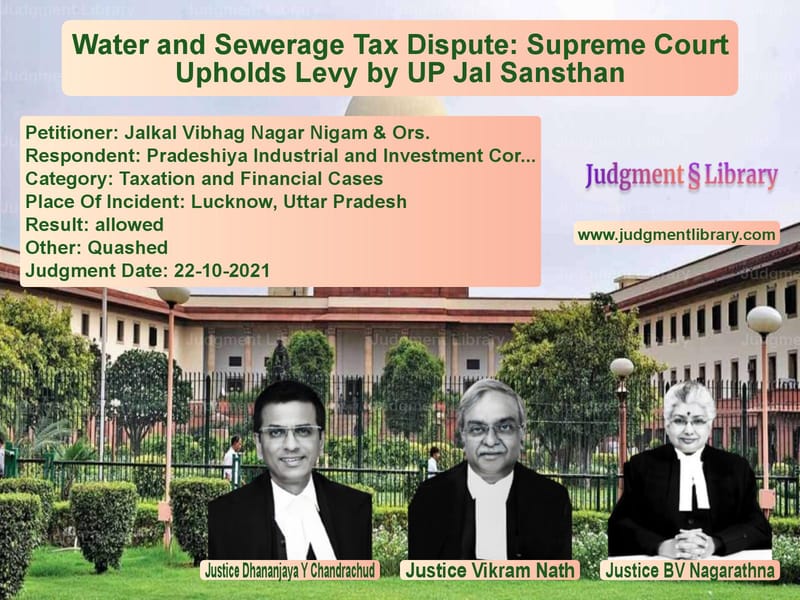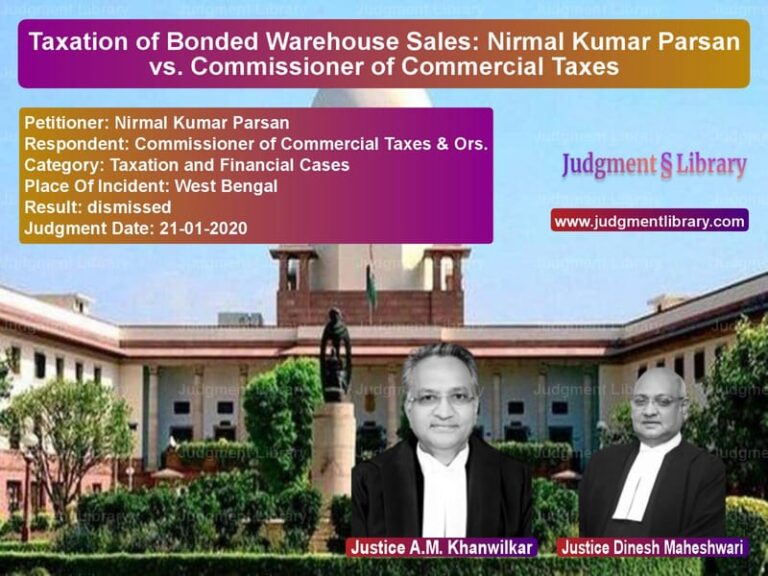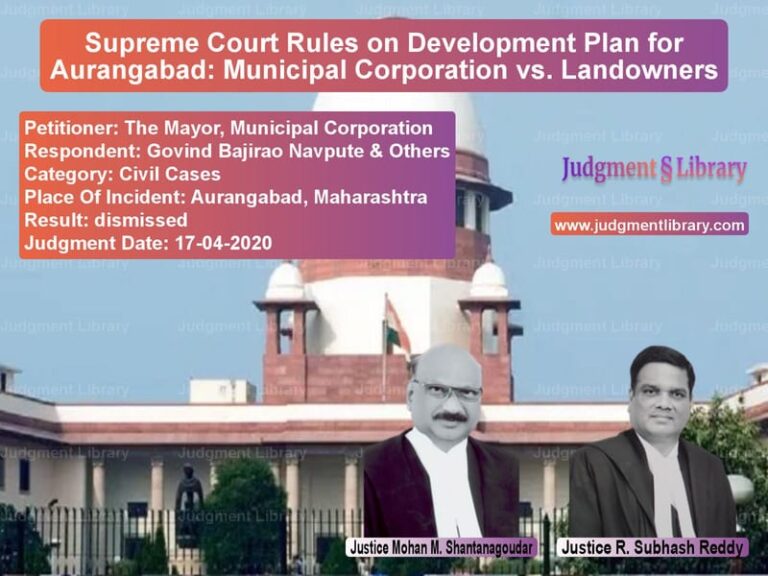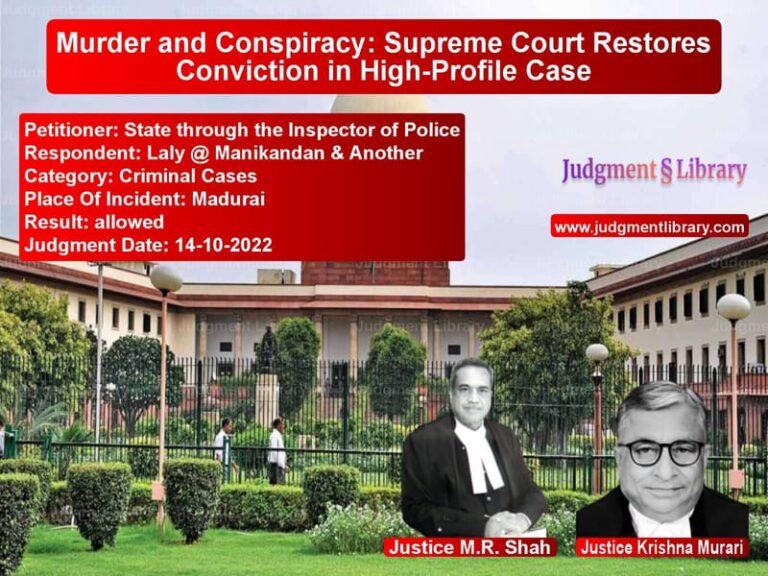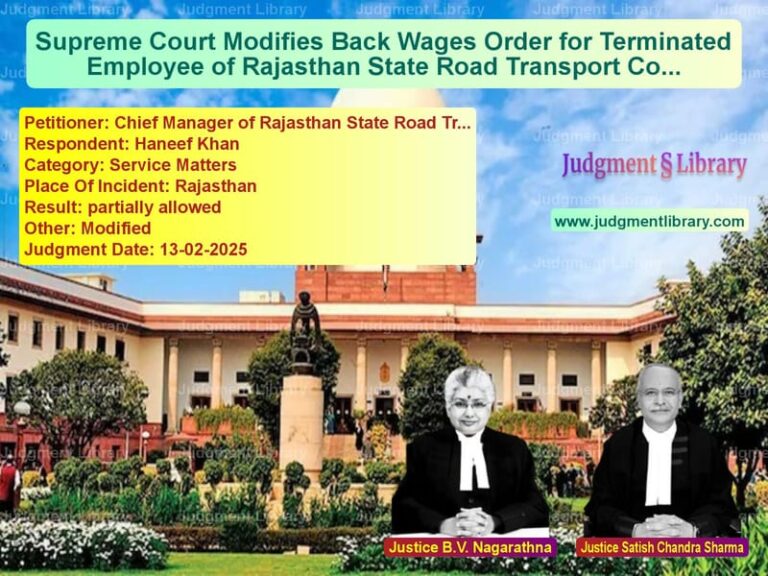Water and Sewerage Tax Dispute: Supreme Court Upholds Levy by UP Jal Sansthan
The Supreme Court of India, in the case of Jalkal Vibhag Nagar Nigam & Ors. v. Pradeshiya Industrial and Investment Corporation & Anr., dealt with a crucial constitutional challenge concerning the levy of water and sewerage tax by the Uttar Pradesh Jal Sansthan. The case, registered as Civil Appeal No. 6107 of 2021, arose from an appeal challenging the Allahabad High Court’s decision to refund taxes collected by the Jal Sansthan. The Supreme Court, in its judgment dated October 22, 2021, delivered by Dhananjaya Y Chandrachud, Vikram Nath, and BV Nagarathna, ruled in favor of the Jal Sansthan, stating that the levy was a valid tax under Entry 49 of List II of the Constitution.
Background of the Case
The case originated when the first respondent challenged the demand for water tax and sewerage tax levied under the Uttar Pradesh Water Supply and Sewerage Act, 1975. The appellant, Jalkal Vibhag Nagar Nigam, raised a demand for Rs. 46,63,312.50/- towards water tax for the period from October 1986 to March 1995, which was later rectified to Rs. 16,45,875.00/-. The respondent contested the demand, arguing that no water was drawn from the municipal supply during the construction period.
High Court’s Decision
The Allahabad High Court, in a ruling dated March 7, 2014, directed the refund of water and sewerage taxes, relying on the Supreme Court’s decision in Union of India v. State of U.P. (2007). The High Court held that the levy was contrary to law.
Issues Before the Supreme Court
The Supreme Court considered the following key issues:
- Whether the demand for water and sewerage tax under the UP Water Supply and Sewerage Act was legally sustainable?
- Whether the State Legislature had the competence to impose such a tax?
Petitioner’s Arguments
The appellant, represented by Pradeep Kant and Madhavi Divan, contended that:
- The UP Water Supply and Sewerage Act provides for the levy of taxes, fees, and charges under different provisions, with Section 52 specifically dealing with taxes.
- The levy was imposed on premises within the jurisdiction of the Jal Sansthan and was calculated based on the annual value of the property.
- The High Court misinterpreted the decision in Union of India v. State of U.P., which dealt with service charges, not taxes.
- The tax was a valid exaction under Entry 49 of List II (Taxes on Lands and Buildings) of the Constitution.
Respondent’s Arguments
The first respondent, represented by Madhavi Divan, argued that:
- The tax was not a tax on lands and buildings but a service fee for water supply.
- Since no water was consumed, no tax should be levied.
- The levy was beyond the competence of the State Legislature and was not covered under Entry 49 of List II.
Supreme Court’s Analysis and Judgment
The Supreme Court upheld the validity of the tax and overruled the High Court’s decision. The key findings were:
- The tax was not a fee but a compulsory exaction, making it a tax within the meaning of the Constitution.
- The levy was imposed on land and buildings, making it a valid tax under Entry 49 of List II.
- The Court clarified that the High Court misapplied the decision in Union of India v. State of U.P., as that case dealt with service charges, not a tax.
- Even if the property owner did not consume water, the presence of water infrastructure justified the levy.
Key Extract from the Supreme Court Judgment
“The levy under Section 52(1)(a) of the UP Water Supply and Sewerage Act is a tax on lands and buildings situated within the area of the Jal Sansthan. The nomenclature of the tax does not alter its character. The tax is imposed to finance the operations of the Jal Sansthan and ensure the maintenance of water and sewerage infrastructure.”
Final Verdict
- The Supreme Court set aside the High Court’s judgment.
- The tax imposed by the Jal Sansthan was upheld as a valid tax under Entry 49 of List II.
- The respondents were directed to pay the pending tax amount with 9% annual interest.
Impact of the Judgment
This ruling clarifies the distinction between a tax and a fee and reinforces the constitutional validity of water and sewerage tax levied by municipal bodies. It sets a precedent ensuring that urban infrastructure development can be financed through property-based taxation, irrespective of actual usage.
Petitioner Name: Jalkal Vibhag Nagar Nigam & Ors..Respondent Name: Pradeshiya Industrial and Investment Corporation & Anr..Judgment By: Justice Dhananjaya Y Chandrachud, Justice Vikram Nath, Justice BV Nagarathna.Place Of Incident: Lucknow, Uttar Pradesh.Judgment Date: 22-10-2021.
Don’t miss out on the full details! Download the complete judgment in PDF format below and gain valuable insights instantly!
Download Judgment: jalkal-vibhag-nagar-vs-pradeshiya-industria-supreme-court-of-india-judgment-dated-22-10-2021.pdf
Directly Download Judgment: Directly download this Judgment
See all petitions in Tax Refund Disputes
See all petitions in Banking Regulations
See all petitions in Judgment by Dhananjaya Y Chandrachud
See all petitions in Judgment by Vikram Nath
See all petitions in Judgment by B.V. Nagarathna
See all petitions in allowed
See all petitions in Quashed
See all petitions in supreme court of India judgments October 2021
See all petitions in 2021 judgments
See all posts in Taxation and Financial Cases Category
See all allowed petitions in Taxation and Financial Cases Category
See all Dismissed petitions in Taxation and Financial Cases Category
See all partially allowed petitions in Taxation and Financial Cases Category

